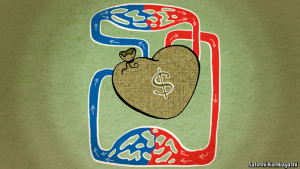
Loading...
11th March 2015

AS THE old joke goes, the questions in economics exams are the same every year; only the answers change. Just 40 years ago, the emergence of stagflation was prompting the monetarists to challenge the disciples of John Maynard Keynes, but after the crisis of 2008 the enthusiasm for Keynesian stimulus was discovered all over again.
In a new book* George Cooper, a fund manager, suggests that the economics profession is itself in a state of crisis. It needs the kind of shift in thinking that Copernicus brought to astronomy, or Charles Darwin to biology, Mr Cooper argues. He cites Thomas Kuhn’s theory of scientific revolutions. First, the existing models are proved wrong by the facts. Second, the experts try to adjust the theory to account for the anomalies, leading to ever-greater complexity. Third, a new theory is put forward that throws away the existing framework. Fourth, the theory is attacked by the experts as being incompatible with the existing model. Finally, younger, more open-minded scientists accept the new theory and it becomes the consensus.